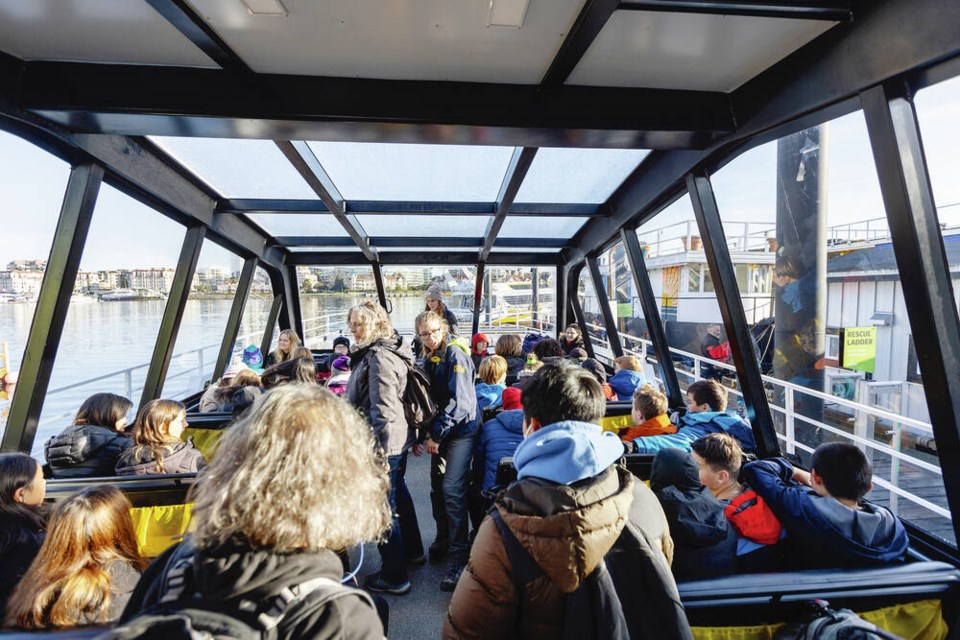It’s early morning at Fisherman’s Wharf and 45 students from Cedar Hill Middle School are eagerly boarding a 60-foot whale-watching vessel.
There’s a palpable feeling of excitement as they await the adventure ahead — a two-hour trip out into the Salish Sea, where they will see humpback whales and orcas, flocks of seabirds and colonies of sea lions.
They’ll pass by marine-life-rich Race Rocks, and swing over to Whirl Bay off Metchosin, where they will visit kelp beds and possibly catch a glimpse of sea otters and bald eagles — even a black bear that’s been known to take ocean dips there.
This isn’t your parents’ classroom. This is interactive learning at its best.
And it’s been going on for four years in a partnership between Victoria-based ecotourism company Eagle Wing Tours and dozens of schools and four school districts in the region.
“This is a chance for kids to basically see the ocean world and eventually work to save that world … in their own backyard,” said Eagle Wing co-owner Brett Soberg.
Soberg said most of the kids who participate have never seen a whale before, and some have never been on a boat, or even to a beach. “So this gets them out there and lets them learn about what a sea lion smells like or what kelp tastes like,” he said.
“That generates a real interest in what they’re learning. They learn to understand the Salish Sea, learn to love it and, eventually, they will be the ones who will work to preserve it.”
Eagle Wing’s Exploring the Salish Sea floating classroom program launched in 2018 in partnership with schools and marine educators. It’s a four-part program that runs from September to March and combines classroom curriculum with on-water research and beach field trips.
Each class chooses an ocean project and by the end of the year displays a model and their research at the Royal B.C. Museum, visiting the museum’s vast Salish Sea collections.
To date, just over 4,000 students have participated in the program. The target for 2022-23 is another 4,000, and the long-term target is 10,000 students a year by 2030.
“It’s a fantastic program and quite an adventure,” said Amy Collins, a Grade 6 teacher at Cedar Hill Middle School.
She said the classroom lessons are augmented by Eagle Wing’s naturalists and biologists visiting the school to talk about their discoveries. The students’ focus this term is on how businesses and others that operate on the Salish Sea can be sustainable and work with nature.
Kathleen Meiklejohn, a Grade 6 teacher at Centre Mountain Lellum Middle School in Langford, said “connecting to all the sights, sounds and smells of the Salish Sea will create lasting memories for my students and help promote a sense of stewardship for this land we’re all guests on,” said Meiklejohn.
Eagle Wing said it takes a financial loss by defraying many of the costs associated with the program. The schools are charged about $35 per student for the program, which includes the tour and staff time for the water, beach and classroom sessions.
Individual schools pay the student fees through parent advisory council fundraisers, and the districts also pick up some costs.
Sponsorships by the Royal B.C. Museum, UVic’s Ocean Networks Canada and Pacific Northwest Transportation Services assist with program logistics, and Soberg is hopeful other like-minded institutions and businesses can contribute as the popularity of the program grows.
Eagle Wings ends up absorbing about 40% of the overall expenses to operate the program, but Soberg said there are huge upsides, including the ability to retain staff through the off-season.
Normally, tourism companies lay off big chunks of their workforce as tourism wanes in the fall, but Eagle Wing general manager Nathan Bird said the classroom program allows the company to create nine full-time positions over the fall and winter seasons.
Soberg, who grew up in Victoria, said his father was an educator, and he was raised in a learning environment.
Fishing his cellphone out of his pocket, Soberg said education “is not this.”
“Education is getting out there to smell a sea lion, watch it, see the birds fly. See how the kelp works. You learn to protect what you can experience and understand.”
Eagle Wing won an international award for the program this summer from the National Marine Educators Association, representing classroom teachers, educators, university professors and scientists from around the globe.
Earlier this year, the program also earned a B.C. Principals and Vice-Principals Association Partnership Award, which recognizes groups that “have made a substantial difference in the lives of students in public schools.”
The program is so popular with teachers and students that there’s a long waiting list and school districts have to use a draw system to determine which classes will participate.
>>> To comment on this article, write a letter to the editor: [email protected]



